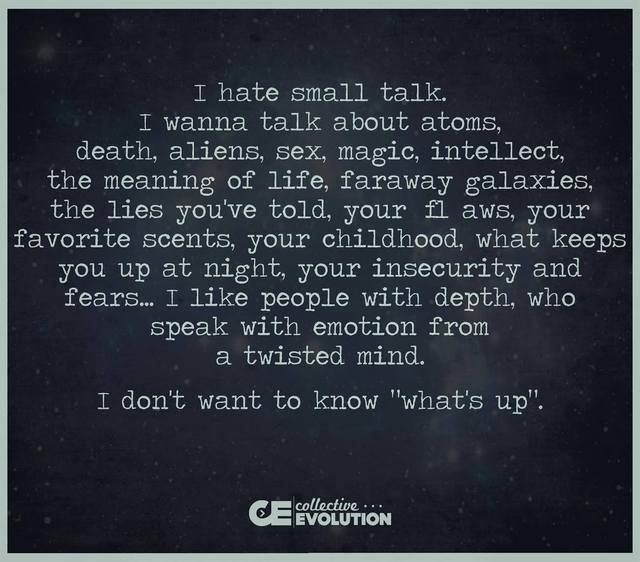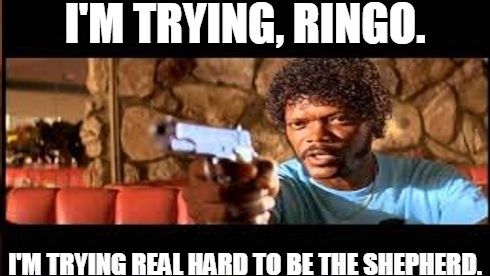Big Thoughts about Small Talk.
I came across this on Facebook the other day:

...and my first reaction was, “OMG YES.” Because I do hate small talk. I hate the superficial insincerity of it, the utter sham that it all is. We make small talk because we feel that we have to, not because we want to. Small talk is a means to an end: finish spending x amount of time with y person without feeling awkward. Words fill the void but mean nothing and are never remembered.
And I suck at small talk. I know it started in college, when I was really upset about my social situation - I had finally, by the end of high school, made friends and established my “place.” But then I went to college, and it all changed; now I had to start all over from square one, learn how to talk to people I didn’t know, and try to make friends again. And all of those old feelings of inadequacy and self-consciousness resurfaced - feelings that I thought I had overcome - and I had no incentive to even try to be outgoing and make friends with total strangers. What was the point? I’d finish a few years here and have to go to the main campus and start all over AGAIN. Then I’d do a few years there and go out into the workforce and start all over AGAIN! The very thought of it was exhausting, and I remember spending some time before one of my classes cynically dissecting small talk that people make when they’re in college: “What’s your major?” “Where are you from?” What was the point?
Small talk was a skill that I never bothered to master - and it really is a skill to be developed, though many people have a gift for it. I don’t think I’m one of those people, so it’s always a struggle for me. However, it’s become a very necessary thing in my job because I spend a great deal of time building personal relationships with my client contacts. Small talk is a necessary evil in my line of work, and since I’m not good at it I decided to research it.

I talked to the therapist I was seeing at the time and also listened to Leil Lowndes’ audiobook of “How to Talk to Anyone” - not a foolproof plan, but good places to start.
So, okay. Focus on current events and the other person’s life and interests. Right. That’s easy, I guess, if I prepare a little ahead of time and think about different ways to keep conversation moving. How’s your summer going? Have you ever been to [the city we’re in] before? Aren’t these hors de oeuvres delicious? How’s [your family member I met once]? Smile, nod, be supportive and non-argumentative even if you don’t agree with them (and holy crap is this one hard for me because I am a principled and opinionated bitch sometimes!). Don’t offer them advice unless they flat out ask you (another habit I’m trying to break myself of). Don’t monopolize the conversation because they really don’t care about you. But then they ask questions about me, to be polite, and I have no short-and-sweet answers: What does your husband do? Do you have any kids? Where are you from? How are you doing?
Aw, crap.
At first my brain was all “SYNTAX ERROR DOES NOT COMPUTE” because I hadn’t actually planned for people to turn those questions back to me. Sure, they still don’t care, and probably won’t remember it nine seconds from now, but I still have to answer them. And while I have answers for those questions, they are either short or polite, but not both. People with kids don’t want to hear a flat “no” to their question about children, because now I’m not a kindred spirit even if we have a million other things in common. Suddenly I’m a pariah because I don’t have kids. Ditto to the husband question: I try to keep it short with “he doesn’t work outside the home,” but then they pry because that’s a mystery. “He’s on disability” garners an “Oh, I’m so sorry!” and/or “What’s wrong?” Their sympathy dissipates a bit when they find out it’s emotional and not physical, even if they try to appear understanding about how difficult it is. I’m not “from” any one place and my emotional state is always in five different spots depending on which facet of my life I’m focusing on - so again, no easy answers. And no one wants my life story when it’s just small talk.
So I have spent a great deal of time thinking about this and analyzing it, preparing myself for the next round of Small Talk Schmoozing. I don’t remember if I hit upon this myself or if it’s something that I got from Lowndes, but I realized something very important: most of the time, people ask you the questions that they, themselves, wish to be asked.
Someone who asks about kids is proud of their own, and wants to be asked. Someone who asks about your spouse? Same thing. How’s my summer? How’s YOUR summer? Clearly you’ve done something you wish to brag about.
I do it, too. I stay away from the where are you from and family questions, and ask about hobbies and vacations. I will throw in pertinent questions about family, if they bring them up, because even if they haven’t asked yet they’re going to, and it’s better for me to ask first because the chances are pretty good they won’t ask about mine because they’re busy boasting about their own points of pride.
And that’s the other thing: if the question of kids comes up, I say, “No, but I have pets. How about you?” BOOM! Conversation reflected back to them, off of me, and they can regale me with tales of how their son got engaged in Prague or their daughter is getting married, would you like to see pictures? Oh, of course!
Learning about how Artificial Intelligence communicates has taught me something else about small talk: pick up on keywords and use them to keep the conversation moving. “So, have YOU ever been to Prague? No? Do you like travel?” Of course, there’s one thing to be done that AI may never be able to pick up on: emotions. “Oh, you must be so excited/upset/nervous.” Reflecting that back to them validates their emotions - it’s okay to feel this way.
The more I think about small talk, the more I look at it like the broad rim of a large funnel. Or maybe the first in a series of sieves. It’s the top edge of communication, the way we (as social beings) filter out the most unsavory of those we encounter. It’s a preview of the person: how they speak, how they hold themselves, and even how they look and smell. You wouldn’t want to get into a conversation about hopes and dreams and atoms with someone who reeks of body odor and has a voice that could peel the paint off walls. You’d be too distracted by thoughts of OMG GET THIS PERSON AWAY FROM ME.
Small talk doesn’t have to be fake. It can be a gateway to serious conversation, but traversing the path from “How are you?” to profound ontological discussions is an art form that takes practice and attention and time. It doesn’t happen in one day; maybe not even in one week or one month. Your mileage may vary. You can have these conversations with your family because you’ve known them all your life, but social acquaintances don’t know you as well (if at all) and you have to start somewhere - trying to jump into the conversational deep end right away actually tends to scare people.

I don’t know if it’s psychology or sociology, but as a culture we’ve lost a lot of our ability to recognize and perpetuate subtlety. I think our brains are wired to notice and appreciate it - even the most straightforward person doesn’t always want to hear or see the end result right away. The best movies and books have a delicate touch, not a heavy-handed approach; think about it, would The Princess Bride be the same if Westley said, straight out upon his return and rescue of her, “’Sup, Buttercup? Hey, chillax, it’s me, Westley!”? Of course not. The Sixth Sense would also be a totally different movie. Another example: the best thesis papers start out general and narrow to a specific premise that becomes the focal point of the paper. And of course, seduction - the loveliest subtlety of them all, whether it’s that initial spark or a round of foreplay. Our attention spans are waning and instant gratification is easier than ever to achieve: Suri, Twitter, Facebook, Vine, Snapchat, and T3 internet lines are all evidence of this. Beyond the realm of social media and the internet, consider how people enter into relationships - the days of “courtship” are long gone, with roughly 30% of first dates ending up in the sack (according to an article by Glamour, so take that statistic with a grain of honey dust). Perhaps simple impatience is a contributing factor (combined with a lack of respect) in the preponderance of violence, especially that against women.
I, too, have fallen prey to the lure of the quick-and-dirty, honing my impatience with every GET TO THE VERB moment I have in conversations with people who tell you how to build a clock when you’ve asked what time it is. I love a speedy internet and an efficient solution to a problem. I’m not immune and I’m not condemning anyone for their preferences; this is all just my opinion, worth the cost of admission.

Like fast food, maybe a fast life isn’t as good for us. Sure, it’s momentarily gratifying, but in the long run it’s unfulfilling and perhaps a little dangerous for our health individually and as a society. To this end I am working on my ability to make small talk; it may be small now, but it has the potential to grow into something greater.

...and my first reaction was, “OMG YES.” Because I do hate small talk. I hate the superficial insincerity of it, the utter sham that it all is. We make small talk because we feel that we have to, not because we want to. Small talk is a means to an end: finish spending x amount of time with y person without feeling awkward. Words fill the void but mean nothing and are never remembered.
And I suck at small talk. I know it started in college, when I was really upset about my social situation - I had finally, by the end of high school, made friends and established my “place.” But then I went to college, and it all changed; now I had to start all over from square one, learn how to talk to people I didn’t know, and try to make friends again. And all of those old feelings of inadequacy and self-consciousness resurfaced - feelings that I thought I had overcome - and I had no incentive to even try to be outgoing and make friends with total strangers. What was the point? I’d finish a few years here and have to go to the main campus and start all over AGAIN. Then I’d do a few years there and go out into the workforce and start all over AGAIN! The very thought of it was exhausting, and I remember spending some time before one of my classes cynically dissecting small talk that people make when they’re in college: “What’s your major?” “Where are you from?” What was the point?
Small talk was a skill that I never bothered to master - and it really is a skill to be developed, though many people have a gift for it. I don’t think I’m one of those people, so it’s always a struggle for me. However, it’s become a very necessary thing in my job because I spend a great deal of time building personal relationships with my client contacts. Small talk is a necessary evil in my line of work, and since I’m not good at it I decided to research it.

I talked to the therapist I was seeing at the time and also listened to Leil Lowndes’ audiobook of “How to Talk to Anyone” - not a foolproof plan, but good places to start.
So, okay. Focus on current events and the other person’s life and interests. Right. That’s easy, I guess, if I prepare a little ahead of time and think about different ways to keep conversation moving. How’s your summer going? Have you ever been to [the city we’re in] before? Aren’t these hors de oeuvres delicious? How’s [your family member I met once]? Smile, nod, be supportive and non-argumentative even if you don’t agree with them (and holy crap is this one hard for me because I am a principled and opinionated bitch sometimes!). Don’t offer them advice unless they flat out ask you (another habit I’m trying to break myself of). Don’t monopolize the conversation because they really don’t care about you. But then they ask questions about me, to be polite, and I have no short-and-sweet answers: What does your husband do? Do you have any kids? Where are you from? How are you doing?
Aw, crap.
At first my brain was all “SYNTAX ERROR DOES NOT COMPUTE” because I hadn’t actually planned for people to turn those questions back to me. Sure, they still don’t care, and probably won’t remember it nine seconds from now, but I still have to answer them. And while I have answers for those questions, they are either short or polite, but not both. People with kids don’t want to hear a flat “no” to their question about children, because now I’m not a kindred spirit even if we have a million other things in common. Suddenly I’m a pariah because I don’t have kids. Ditto to the husband question: I try to keep it short with “he doesn’t work outside the home,” but then they pry because that’s a mystery. “He’s on disability” garners an “Oh, I’m so sorry!” and/or “What’s wrong?” Their sympathy dissipates a bit when they find out it’s emotional and not physical, even if they try to appear understanding about how difficult it is. I’m not “from” any one place and my emotional state is always in five different spots depending on which facet of my life I’m focusing on - so again, no easy answers. And no one wants my life story when it’s just small talk.
So I have spent a great deal of time thinking about this and analyzing it, preparing myself for the next round of Small Talk Schmoozing. I don’t remember if I hit upon this myself or if it’s something that I got from Lowndes, but I realized something very important: most of the time, people ask you the questions that they, themselves, wish to be asked.
Someone who asks about kids is proud of their own, and wants to be asked. Someone who asks about your spouse? Same thing. How’s my summer? How’s YOUR summer? Clearly you’ve done something you wish to brag about.
I do it, too. I stay away from the where are you from and family questions, and ask about hobbies and vacations. I will throw in pertinent questions about family, if they bring them up, because even if they haven’t asked yet they’re going to, and it’s better for me to ask first because the chances are pretty good they won’t ask about mine because they’re busy boasting about their own points of pride.
And that’s the other thing: if the question of kids comes up, I say, “No, but I have pets. How about you?” BOOM! Conversation reflected back to them, off of me, and they can regale me with tales of how their son got engaged in Prague or their daughter is getting married, would you like to see pictures? Oh, of course!
Learning about how Artificial Intelligence communicates has taught me something else about small talk: pick up on keywords and use them to keep the conversation moving. “So, have YOU ever been to Prague? No? Do you like travel?” Of course, there’s one thing to be done that AI may never be able to pick up on: emotions. “Oh, you must be so excited/upset/nervous.” Reflecting that back to them validates their emotions - it’s okay to feel this way.
The more I think about small talk, the more I look at it like the broad rim of a large funnel. Or maybe the first in a series of sieves. It’s the top edge of communication, the way we (as social beings) filter out the most unsavory of those we encounter. It’s a preview of the person: how they speak, how they hold themselves, and even how they look and smell. You wouldn’t want to get into a conversation about hopes and dreams and atoms with someone who reeks of body odor and has a voice that could peel the paint off walls. You’d be too distracted by thoughts of OMG GET THIS PERSON AWAY FROM ME.
Small talk doesn’t have to be fake. It can be a gateway to serious conversation, but traversing the path from “How are you?” to profound ontological discussions is an art form that takes practice and attention and time. It doesn’t happen in one day; maybe not even in one week or one month. Your mileage may vary. You can have these conversations with your family because you’ve known them all your life, but social acquaintances don’t know you as well (if at all) and you have to start somewhere - trying to jump into the conversational deep end right away actually tends to scare people.

I don’t know if it’s psychology or sociology, but as a culture we’ve lost a lot of our ability to recognize and perpetuate subtlety. I think our brains are wired to notice and appreciate it - even the most straightforward person doesn’t always want to hear or see the end result right away. The best movies and books have a delicate touch, not a heavy-handed approach; think about it, would The Princess Bride be the same if Westley said, straight out upon his return and rescue of her, “’Sup, Buttercup? Hey, chillax, it’s me, Westley!”? Of course not. The Sixth Sense would also be a totally different movie. Another example: the best thesis papers start out general and narrow to a specific premise that becomes the focal point of the paper. And of course, seduction - the loveliest subtlety of them all, whether it’s that initial spark or a round of foreplay. Our attention spans are waning and instant gratification is easier than ever to achieve: Suri, Twitter, Facebook, Vine, Snapchat, and T3 internet lines are all evidence of this. Beyond the realm of social media and the internet, consider how people enter into relationships - the days of “courtship” are long gone, with roughly 30% of first dates ending up in the sack (according to an article by Glamour, so take that statistic with a grain of honey dust). Perhaps simple impatience is a contributing factor (combined with a lack of respect) in the preponderance of violence, especially that against women.
I, too, have fallen prey to the lure of the quick-and-dirty, honing my impatience with every GET TO THE VERB moment I have in conversations with people who tell you how to build a clock when you’ve asked what time it is. I love a speedy internet and an efficient solution to a problem. I’m not immune and I’m not condemning anyone for their preferences; this is all just my opinion, worth the cost of admission.

Like fast food, maybe a fast life isn’t as good for us. Sure, it’s momentarily gratifying, but in the long run it’s unfulfilling and perhaps a little dangerous for our health individually and as a society. To this end I am working on my ability to make small talk; it may be small now, but it has the potential to grow into something greater.